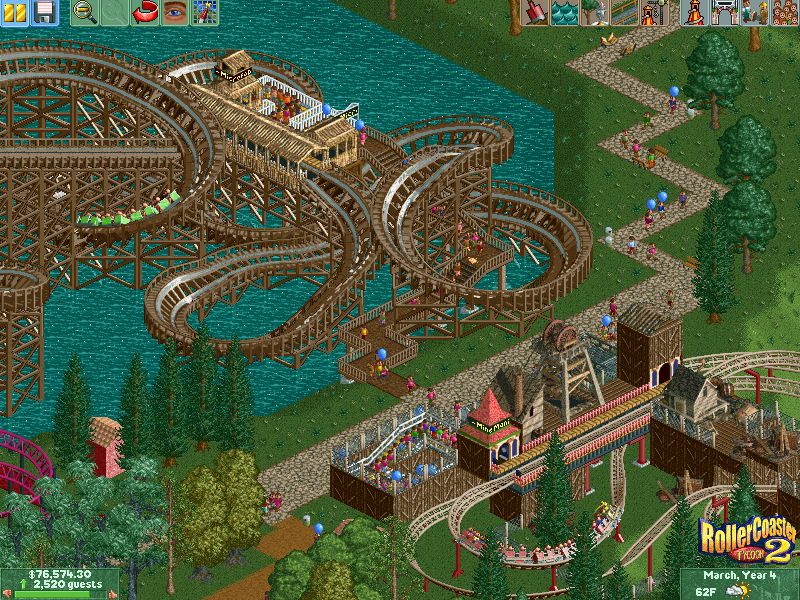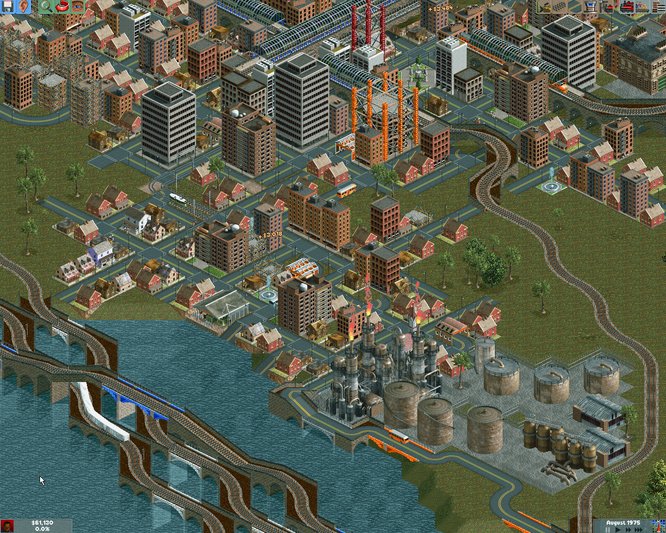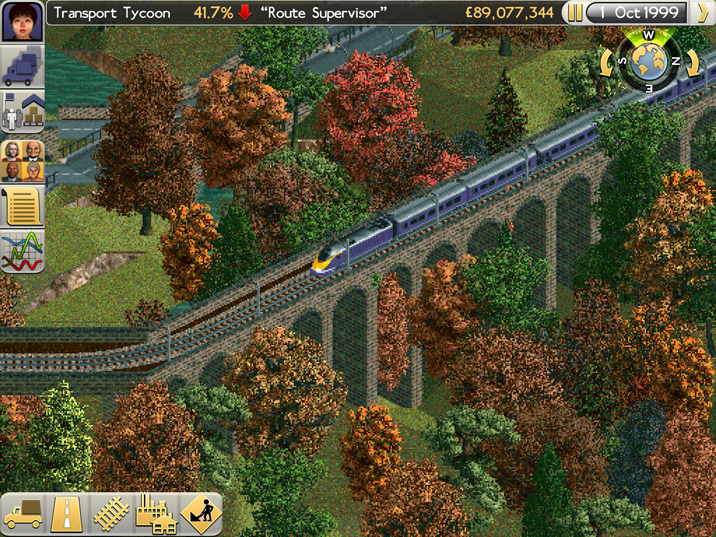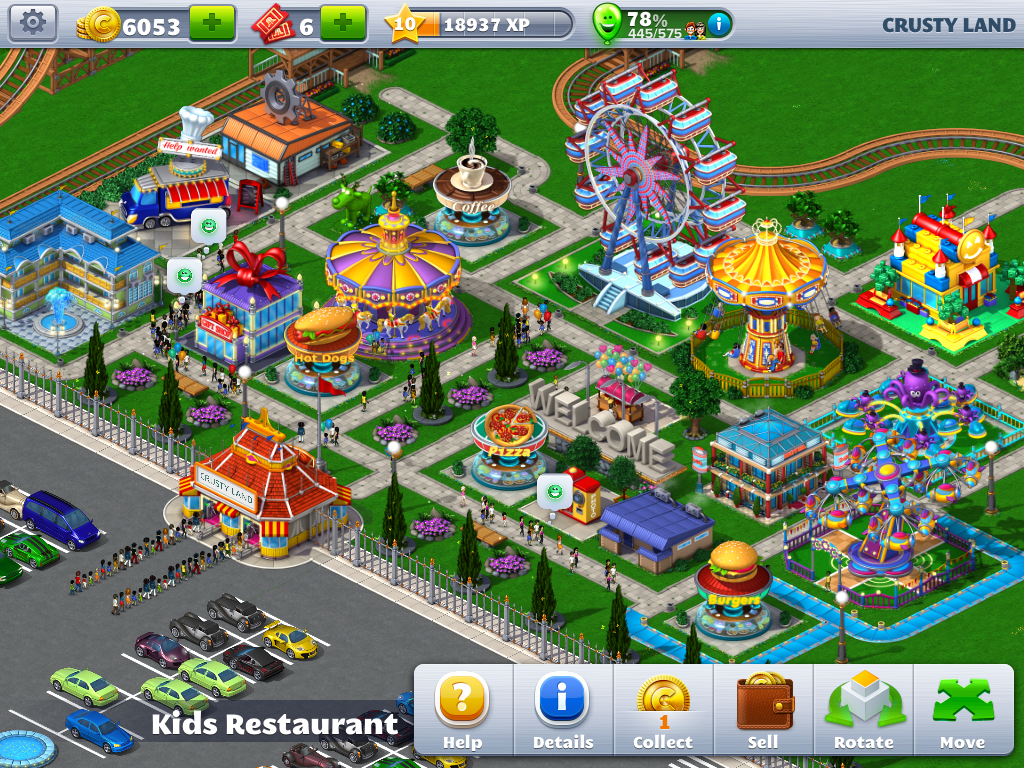20 years of RollerCoaster Tycoon: an interview with the creator of the game

March 31, 1999 was released game RollerCoaster Tycoon, fully created by one person and written in x86 assembly language. In honor of the anniversary of the game, we publish a translation of an interview with the author, recorded in 2016.
Today, few people remember the name of the Scottish programmer and video game designer Chris Sawyer. It seems that the inventor of RollerCoaster Tycoon happily allowed Atari to create new games in his beloved series of strategies, while he himself took up more important things for him now. And yet, despite the radio silence, Sawyer’s games are still remembered and revered by many more than 20 years ago.
Being engaged in the transfer from Amiga to PC of such games as Elite Plus, Frontier Elite 2, Birds of Prey and Dino Dini's Goal in the early 90s, Sawyer created his first head simulator called Transport Tycoon. He wanted to develop the ideas of Sid Meier's Railroad Tycoon, combining its gameplay elements with his isometric graphics code, and create a new type of maps. MicroProse approved Transport Tycoon, released it in 1994, and the game became a hit. Its expanded and improved version of Transport Tycoon Deluxe was released just a year later.
')
In the process of planning a sequel to Transport Tycoon, Sawyer fell in love with roller coasters. And so his next project turned into a game RollerCoaster Tycoon, released in 1999. She also became a hit. She was followed in 2002 by RollerCoaster Tycoon 2. It became an even bigger hit. Despite partnerships with publishers such as Hasbro, Sawyer retained the ownership of the RollerCoaster Tycoon franchise, and, judging by all, thanks to success, it justified itself.
Later, Sawyer decided to let go of the reins of the RollerCoaster Tycoon and let others control the trolley. Released in 2004, RollerCoaster Tycoon 3 was developed by Elite: Dangerous, by Frontier. In the same year, Sawyer released Locomotion, which he called the spiritual successor to Transport Tycoon.
And then ... everything was quiet. Sawyer disappeared from radar screens for a dozen years, having appeared only in 2013 to release the mobile version of Transport Tycoon along with a small team of Origin8 developers. What about the RollerCoaster Tycoon? Atari, who had once entered into legal litigation with Sawyer due to unpaid license fees, is currently licensing his RollerCoaster Tycoon to create a new series of games. But for now these games get bad reviews.
Atari’s RollerCoaster Tycoon 4 Mobile proved to be an overwhelming microtransaction disillusionment. She was so bad that in our review we gave her a rating of 1/10. And being in the work of RollerCoaster Tycoon World suffers from problems in the development: people speak negatively about its quality , there are delays , and a new game studio has begun to create it.
All this is happening at the time when Frontier is working on Planet Coaster, a promising amusement park management simulator that many RollerCoaster Tycoon fans are hoping for.
Therefore, it seems to me that today it will be interesting to conduct an interview with Chris Sawyer. What is happening at the moment? How much does he participate in the development, and is he involved at all? Why his games many years later after graduation continue to please so much? What does Atari do with the RollerCoaster Tycoon, in his opinion?
In preparation for the interview, Sawyer said that he was "a very isolated person." Yes, he gives an interview, but prefers to answer questions by e-mail. Usually I do not conduct interviews through the mail, but it turned out that this is the only option, so I agreed.
And here's the result: a conversation with the creator of RollerCoaster Tycoon Chris Sawyer about almost everything.

Chris Sawyer.
Thank you for agreeing to answer our questions. First, I wonder what you are working on at the moment?
Chris Sawyer: Now my favorite project is transferring an old PC RollerCoaster Tycoon 2 game to modern mobile devices and tablets. This is not an easy task, considering that the original game was written on a low-level x86 assembler code that only works on a PC. But thanks to the success of Transport Tycoon on mobile platforms and with the experience and willingness of a small Origin8 development team, it seems quite achievable to me. So now we are working with them to create a very exact copy of the original game for the PC.
I believe that more modern versions of RollerCoaster Tycoon have slightly changed the style and gameplay, and therefore now the market has a demand for the original "classic" version of the game with its unique graphic style and simpler gameplay. The success of Transport Tycoon showed us how the touch interface of mobile phones and tablets fits the style of the game. For me personally, this is a very exciting project and I am really looking forward to its completion and publication.
What does your typical day look like?
Chris Sawyer: very different. Now I spend a lot of time every day with the Origin8 team. They are trying to deal with my old files of the source code RollerCoaster Tycoon 2, but I participate only when necessary. On such days, I’m more involved in personal life, volunteer work and hobbies (including a roller coaster - I already have 657 different attractions!) I hope I’ll never have to go back to the time when I worked 16 hours a day and seven days a week, even though I liked every minute.
You mentioned volunteer community service. Can you tell us more?
Chris Sawyer: Among other things, I go to local elementary schools once a week and help them work with the media. This is very exciting and I learn from children almost as much as they do with me.
What roller coaster will be next on your list?
Chris Sawyer: I've already seen so many rides that now only something really outstanding can surprise me. I like the way Taron looks like, which is being built in the German Phantasialand. Many winding paths are concentrated on a very small area and complemented by thematic rocks and surroundings. When they are finished, I will definitely put them on my list.
I am also interested in new roller coaster called Wildfire, being built in Kolmården in Sweden.

“I still like this game and everything connected with it,” Chris Sawyer about RollerCoaster Tycoon 2.
Probably you are most known for creating the Tycoon game series. Looking back at all the work you have done, what game are you most proud of and why?
Chris Sawyer: in terms of success and game design, this is without a doubt RollerCoaster Tycoon 2. I still like this game and everything connected with it. It's amazing to realize that in all these years so many people have played it. However, as a programmer, I am most proud of Chris Sawyer's Locomotion, because I think this is the best program code I've ever written. It is much more complicated than RollerCoaster Tycoon, but the code was much better structured, and I really enjoyed writing the AI code of competing companies, the plugin data system (which is now supported by a large online community of fans) and creating a well-functioning network multiplayer system.
Is there a design philosophy behind all of your games?
Chris Sawyer: When writing games, I never had a design philosophy, I just worked on those ideas that are interesting to me at the moment. But looking back today, I think my games are peculiar to philosophy, similar to Lego. These are games in which the player block by block builds structures in a fairly simple and limited environment, and then interacts with these models in order to achieve their proper operation, if necessary, improving and rebuilding individual elements, receiving rewards for their construction and management skills.
Perhaps this Lego-style philosophy explains why I allowed Frontier and Atari to take on the task of creating RollerCoaster Tycoon 3 and further games? I understood that the logical way to develop the game is to add new details, use a three-dimensional camera and eliminate the limitations of block construction. But for some reason I didn’t really like the idea of such a development, so it was right to transfer the game to those who joyfully set about its further movement.
You have been a part of the gaming industry for over 30 years. What, in your opinion, are the most important changes you have observed?
Chris Sawyer: in terms of development, the biggest change was the increase in the size and scope of development teams; we have moved from the stage of lonely developers of the past to large teams of programmers, artists, screenwriters and producers. The lack of big teams is huge. No one wants to risk such huge costs by developing an original (ie risky) game, so although the games are becoming more and more, there is no diversity in them.
In a sense, we made a full circle, because now it is very easy to create simple mobile games with small budgets and tiny teams, but often there are problems due to another major change in the games industry: making mobile games so simple that now there are a lot of them and it is rather difficult to earn them. The traditional model with the purchase of games rarely works on mobile platforms, because players are inclined to free games, and the use of other methods of generating income within the game, such as advertising or in-game purchases, can annoy or interfere with the gameplay.
Personally, I am disgusted with all the games that are deliberately trying to hook the player and convince him that to continue or simplify the game he needs to pay, but this system has proved its success.
Are you playing anything now? Do you play modern games? Do you like any particular genres or developers?
Chris Sawyer: Honestly, I rarely play now. The world of games has gone forward, and I stayed in one place, and I miss the imperfect style and awkward simplicity of the games created 20 years ago. I admire the amazing graphics, huge size and realism of many modern games, but for some reason they do not cause me enthusiasm. Perhaps they are too realistic? I do not know, but too much realism in games does not appeal to me. I am subscribed to the only gaming magazine: Retro Gamer!
You own the copyright and trademark name of RollerCoaster Tycoon. I understand that when it comes to funding and distribution through a publisher, it’s very difficult for developers to retain rights to their games. How did you manage to keep the RCT rights first and then keep them for so long?
Chris Sawyer: In the late 90s, I created the first RollerCoaster Tycoon game completely independently, so it was almost ready when no publisher had ever seen it. It probably simplified the preservation of rights, and there is no doubt that this was my game, it was not funded or initiated by the publisher.
I was also lucky that the publishing talks were conducted by my business agent Jackie Lyons from Marjacq, who always insisted on preserving the maximum rights of her clients, and not just “selling” them. I have no doubt that without her many years of care and perseverance I would not have such fame, and the games would not have been so successful.
It is also possible that the chosen publisher (Hasbro Interactive) was not aware of the potential long-term value of the franchise at that time, as we all did - it seemed like a risky game with a niche audience that would have difficulties in the market.

Sawyer’s latest original game was Locmotion, released in 2004.
It seems that after the release of Locomotion in 2004, you have a little shy away from the gaming industry. Why? And what did you do in the interval between its release and the founding of 31X Ltd in 2010?
Chris Sawyer: By the end of 2004, he had been living, breathing and working only on games for 20 years. It is time to change priorities, take a break, reduce workload and invest more time and effort in privacy and other interests, and not just spend 16 hours a day sitting in front of the computer. In addition, I felt that I had achieved what I wanted, and I lacked the inspiration for the development of the old ones, or for the creation of new games.
I was particularly disgusted by the tendency to increase cruelty and destructiveness in games. The gaming industry was moving forward, the games were getting bigger and more complex, and I just didn’t have the enthusiasm to create games of this type or to work in a large team developing such games. Also, all aggravated litigation with Atari regarding license fees. It took several years to work with lawyers and spending, before we reached an agreement, which spoiled my attitude to the industry as a whole.
I read that they call you "mad genius." How would you describe yourself?
Chris Sawyer: Perhaps with the “insane” I would agree! Not sure how I could call myself - probably as petty, purposeful, obsessed with details, sometimes stubborn, often persistent and usually frivolous.
I was told that you are "a very reserved person." You rarely talk to the press and fans. Why?
Chris Sawyer: In the mid-90s I was very socially active, I communicated with players and fans over the Internet, but after the success of Transport Tycoon it became boring to me and eventually it became an obstacle to what I want to do - to create games with complete freedom . This not only took too much time, but it also hindered focusing on what is best for my games - everyone has their own unique opinion about how the games should work and what functions they should have.
It would be too easy to create a “community-developed” game, so blurred that it would lose its character and become a bunch of unrelated functions. Therefore, from this point on, I limited my communication and just started to create my own vision of the game I'm working on, even if it meant that there would be flaws in it. At the very least, her character will remain and she will stand out and have a holistic design. I never stopped reading fan forums and strongly respect fans and their views, but rarely personally participate in discussions.
As for the press, I have participated in many interviews for many years and rarely refused them, but I didn’t like self-promotion, and I don’t think that I can justify the image of a mythical character who sometimes considers me to be an online community. I think that since the first Transport Tycoon and especially after the success of the RollerCoaster Tycoon, the games have outgrown me and I give them the opportunity to speak independently.
Your games are incredibly influenced by a whole generation of game developers, and are still loved by the dedicated army of gamers. Why do your games last so long?
Chris Sawyer: probably a combination of several factors. These are very positive games dedicated to construction, proper design, management and “growing”, they allow players to “create” and I believe that they have an individual “character” in terms of appearance and sensations.

Sawyer reappeared on the scene in 2013, releasing the mobile version of Transport Tycoon.
In 2013, ten years after the suspension of game development, you released Transport Tycoon on mobile devices. What caused your return? How did the game show itself?
Chris Sawyer: The driving force behind this project was my business agent Jackie Lyons. She was able to foresee that Transport Tycoon is capable of complying with modern touch mobile devices and together we founded 31X Ltd to create new versions of Transport Tycoon. At first, we had a few false starts, mainly due to the difficulties of porting the old source code in x86 assembler and my reluctance to simplify or limit the original game, but in the end we created a complete game that looked very good and played on touch screen devices.
Sales of the game were decent, and it continues to be sold even after several years, and the reviews are mostly very positive.
You have a long working relationship with Atari, which has its pros and cons . How could you describe this relationship?
Chris Sawyer: Yes, our relationship resembled a roller coaster! I do not hold on to them evil and I think that we all learned from the past, and now our relationship with Atari is built on a healthy basis.
Atari has a subsidiary called RCTO Productions, LLC, which manages the games of the RollerCoaster Tycoon series. I understand that you own the trademark, but how can you explain ownership of the series in relation to Atari? What exactly does she control?
Chris Sawyer: I own the intellectual property rights and trademarks of RollerCoaster Tycoon, and the rights to create and market new RollerCoaster Tycoon games are licensed by Atari Interactive.
How do these relationships work? When Atari licenses your RollerCoaster Tycoon trademark for a new game, do you have the right word in quality control?
Chris Sawyer: I almost don't interfere in the creation of new Atari games. I never wanted to participate in the design and game development, and given the value of the franchise for Atari, I can expect their own quality control department to ensure the quality of the finished product.
You said that you prefer not to interfere with the work on the new Atari games of the RCT series. Why?
Chris Sawyer: I think you need to understand that my personal vision of RollerCoaster Tycoon was completed with the latest version of the game, which I created myself, namely RollerCoaster Tycoon 2, and I am no longer interested in working on someone else's vision of future versions of the game. It is better to allow those who have inspiration to realize their own vision in the new version of the game and not interfere.
RollerCoaster Tycoon has come a long way since RCT1 and RCT2, and although I’m curious to see how new games evolve and evolve, I’m not the right person to direct or limit the design and development of games that are so different from mine.

RollerCoaster Tycoon 4 Mobile disappointed many fans of previous RollerCoaster Tycoon games, but was financially successful for Atari .
What do you think about RollerCoaster Tycoon 4 Mobile? Have you ever participated in its development?
Chris Sawyer: Atari had complete freedom in the development and marketing of RCT4Mobile - with the exception that I saw several assemblies in the development process, I didn’t participate in this. I know that there was a lot of controversy regarding the marketing model and design of the game, but there is no doubt that the game was a success for Atari.
How did you participate in the development of RollerCoaster Tycoon World Atari? Have you worked in any degree with the developers?
Chris Sawyer: From time to time I heard the feedback from the developers and saw several assemblies, but otherwise I completely pulled away. This is Atari's own project and I have nothing to do with design or development.
We have heard many times that there are problems in the development of RollerCoaster Tycoon World. How do you look at the quality of the product and the guidance from Atari?
Chris Sawyer: In a sense, I'm not surprised that the development was so problematic - they aimed at a very big game with high ambitions, and I know how difficult even RollerCoaster Tycoon 1 and 2 were. I think it's good that Atari realized that everything is going wrong, and was ready to postpone the release of the game and return to the beginning with a new team. I hope they manage to complete the game and achieve all ambitious goals.
Are you worried that Atari will hurt the reputation of the game series and brand you created with RollerCoaster Tycoon 4 Mobile and RollerCoaster Tycoon World?
Chris Sawyer: To some extent, I have to trust them in creating a positive image of the RollerCoaster Tycoon franchise. They know what they are doing, and they definitely don’t want to devalue such an important part of their gaming franchise portfolio.
You say that you trust Atari in building the RCT franchise right, and I think your fans hope so too, but many of the company's recent games have disappointed. At a minimum, for example, the recent Atari shooter, which has been unplayable for five months. Is it likely that Atari will create such a bad RCT game that you revoke the license? Is it possible that you want to do this?
Chris Sawyer: Atari has a limited license, so it’s in their own interest to provide a high enough quality for new RollerCoaster Tycoon games to build a franchise for the future, and I’m sure they will ensure the long-term success of their games.
The release of Atari's RollerCoaster Tycoon World was postponed several times, and the game changed its developer. But can she finally get back into the rut?
Do you maintain a working relationship with Frontier Developments? Did you participate in the creation of a mobile port of RollerCoaster Tycoon 3?
Chris Sawyer: I was a consultant during the development of RollerCoaster Tycoon 3 for PC in 2003-2004, but did not participate in the recent porting of the game.
Frontier Developments is working on Planet Coaster, which many consider to be the spiritual successor to the RollerCoaster Tycoon. Have you ever thought about selling a license for the Frontier RollerCoaster Tycoon trademark and about working together on a new game series? I think fans of your games would be delighted with such a prospect!
Chris Sawyer: The rights to develop new RollerCoaster Tycoon games have been licensed by Atari for many years, so now Atari depends on whether they want to sublicense these rights to Frontier Developments or use Frontier to develop a new game, so I cannot answer this question.
How would you describe your relationship with David Braben?
Chris Sawyer: It seems that I first met David in 1988 when I was working on porting his game Zarch (published on a PC called Virus) on a PC, and since then we have maintained relationships and overlap from time to time, not last but not least, because Frontier created extensions for RollerCoaster Tycoon 2 and was going to develop RollerCoaster Tycoon 3.
I like David’s ambitious aspirations for the Elite series and his undying enthusiasm for games in general, and how he turned his gaming programmer career into a large and very successful company with a large team and resources capable of leading his projects to a result.
What are your future plans? Are you thinking about creating a new game?
Chris Sawyer: At the moment my plans do not extend beyond completing RollerCoaster Tycoon 2 and publishing on mobile platforms. So for now, I have no idea. I will never categorically abandon the idea of creating a new original game, but the likelihood of this is small. I seem to be getting older, and I want something simpler!
Source: https://habr.com/ru/post/445918/
All Articles